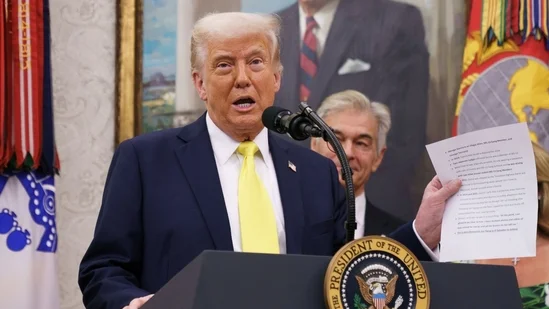
What Does Trump’s New Trade Warning Mean for Global Markets?
In a striking announcement, former President Donald Trump recently issued an eight-point warning regarding what he calls "non-tariff cheating," highlighting key economic issues that could have profound implications for global trade dynamics.
As the world grapples with an ever-evolving economic landscape, Trump's statements come at a critical time. His focus on practices such as currency manipulation, export subsidies, and protective agricultural standards raises questions about fairness in international trade. This is particularly significant as it follows his controversial 90-day pause on tariffs, aimed at providing a temporary reprieve to countries involved in ongoing negotiations.
According to Trump, countries that engage in practices such as dumping below cost and transshipping to evade tariffs could face consequences. He cites Japan's infamous "bowling ball test" as a deceptive technical standard that favors local industries over U.S. competitors. "They take a bowling ball from 20 feet in the air and drop it on the hood of the car. If it dents, the car doesn’t qualify. It's horrible," Trump remarked, emphasizing his stance on the need for transparency and fairness.
The former president's cautionary stance resonates amid rising tensions surrounding U.S.-China trade relations, which have kept financial markets on edge. China, having faced increased tariffs previously, is now being singled out with a staggering 145 percent tariff threat, raising alarm bells among global economists about possible retaliatory measures that could destabilize markets further.
During a recent press briefing, Trump acknowledged the tricky nature of the bond market, stating, "The bond market is very tricky. I was watching it... We wrote it from our hearts, and I think it was well written too." This comment seems to indicate a mix of confidence and concern within the administration regarding economic responses to trade policy.
The 90-day pause on tariffs indicates a tactical retreat, allowing for negotiations while temporarily easing the burden on international markets. With over 75 countries reportedly approaching the U.S. without retaliation, Trump's approach appears to be a balancing act between maintaining pressure on trade practices and avoiding potential fallout from overly aggressive tariffs.
As Trump and his team continue to navigate these turbulent waters, the overarching question remains: how will these policies affect everyday consumers and businesses globally? Will Trump's focus on rectifying non-tariff cheating lead to fairer trade practices, or could it ignite further conflicts?
Public sentiment is mixed, as many support the notion of protecting American jobs, while others fear that aggressive posturing could isolate the U.S. on the world stage. Readers are encouraged to reflect on these developments and share their thoughts on how they believe this unfolds for global trade dynamics in the future.